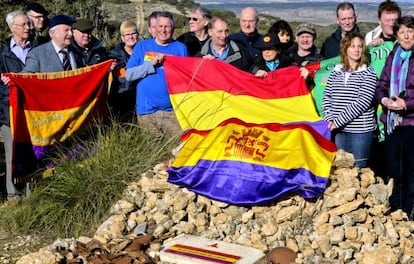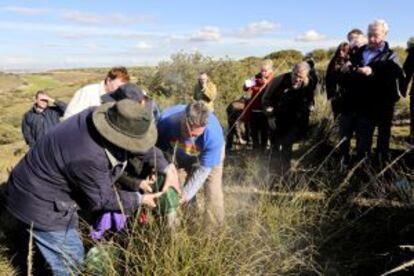In death, British ‘brigadista’ returns to Spanish Civil War battlefield
Jack Edwards, who died in 2011, was the last UK volunteer to leave Spain under his own steam


He had no friends or relatives in Spain. He had never used a weapon in his life. He had a job back home (as a mechanic), a girlfriend (Ivy) and his whole life ahead of him. But at age 22, Jack Edwards risked it all to fight in someone else’s war, in a country where he had never set foot before.
Along with other youths like himself, some just barely out of childhood, he left Liverpool to enlist in the International Brigades, the army of foreign volunteers — 35,000 from 55 countries — who supported the Republican government side during the Spanish Civil War (1936-1939).
“My father always said that the most important thing he had ever done in his life was to fight fascism in Spain,” explains his son Pete, now 72, as he rides a bus to the River Jarama valley to fulfill Jack Edwards’ last wish: for his ashes to be scattered on the former battlefield.
There with Pete were his siblings Margaret and Colin, as well as one of Edwards’ grandchildren, Rachel. There were also around 40 English and Irish nationals here for the 77th anniversary of the Battle of Jarama.
“This small valley became a deadly trap,” explained Danny Payne, the group coordinator. “That hill over there was christened Suicide Hill [...] They couldn’t use their machine guns because the ammunition was all wrong, a different caliber...”

Pete, Margaret, Colin and Rachel listened carefully. Then, they moved slightly away from the main group, extracted two urns — one containing Jack’s ashes and the other his wife Ivy’s — and scattered the contents of both across the valley amid a deep silence. The Edwards then unfurled a Spanish Republican flag while Manus O’Riordan sang an adaptation of The Galtee Mountain Boy, a song from the Irish war of independence, now turned into a tribute to the international brigadistas “who fought for freedom.”
Ivy, the girlfriend who stayed behind in Liverpool, collected funds for the Republic’s cause and began nursing studies while Jack was in Spain. “Their plan was for her to join my father in the war and help as a nurse, but she didn’t have time. Franco won first,” explains Pete Edwards.
Jack Edwards died in 2011, at age 97. “She died before that. She was not there to see how in 2009 he received Spanish nationality [through the Historical Memory Law]. My father was so proud of that passport! It was a pity that my mother missed that. She wanted to be with him, and my father wanted to be here; that’s why we brought them both.”
“My father’s heart was always here in Spain,” adds Margaret. “Right here, in the Jarama valley, he was shot in the foot. He was evacuated to the hospital but still refused to go home.”
Edwards was very lucky. He survived but watched his best friend die, as well as many others. On the first day that the British battalion faced combat action, February 12, 1937, fewer than 200 out of 600 soldiers survived.
After being discharged from the hospital, Edwards lost track of the brigadistas but joined a unit in Valencia. Finally, he was the last British brigadista (who had not been made prisoner) to leave Spain, in March 1939.
“He crossed the Pyrenees alone, on foot. He lived off what he could find and what people gave him,” recalls Pete. “Spaniards had precious little, but they shared. Many of them offered him fried sheep’s blood. He said he loved it!”
Pete confesses that his father had become disappointed with democratic Spain. “He was sad at how little had been done for the victims, to find those who went missing, and the fact that it was not taught in school. I suppose everything is harder here because the war broke up many families, and that’s not easy to forget. But it’s time to talk about it and resolve things.”
Tu suscripción se está usando en otro dispositivo
¿Quieres añadir otro usuario a tu suscripción?
Si continúas leyendo en este dispositivo, no se podrá leer en el otro.
FlechaTu suscripción se está usando en otro dispositivo y solo puedes acceder a EL PAÍS desde un dispositivo a la vez.
Si quieres compartir tu cuenta, cambia tu suscripción a la modalidad Premium, así podrás añadir otro usuario. Cada uno accederá con su propia cuenta de email, lo que os permitirá personalizar vuestra experiencia en EL PAÍS.
¿Tienes una suscripción de empresa? Accede aquí para contratar más cuentas.
En el caso de no saber quién está usando tu cuenta, te recomendamos cambiar tu contraseña aquí.
Si decides continuar compartiendo tu cuenta, este mensaje se mostrará en tu dispositivo y en el de la otra persona que está usando tu cuenta de forma indefinida, afectando a tu experiencia de lectura. Puedes consultar aquí los términos y condiciones de la suscripción digital.








































